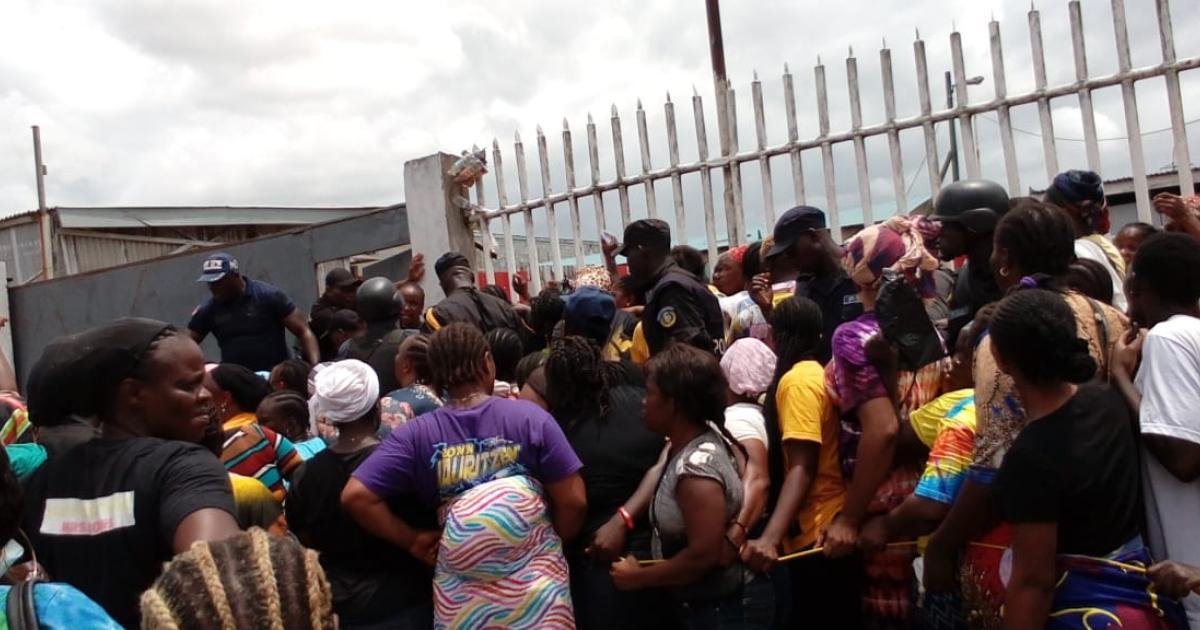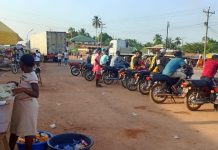Africa-Press – Liberia. Youtee Kolee, before the ongoing rice crisis, had a hassle-free access to rice supplies at any time.
In the past, Kolee, who owns a bigasan shop selling a variety of rice in the Waterside commercial district, Central Monrovia, would spend less than three hours getting her supply in whatever qualities she wants. But those days are long gone, as Kolee and so many must now wait numerous nights in front of importers’ warehouses simply to get their hands on a few bags of rice, which has been in limited supply across the country for weeks.
“They say rice is in the country but this is not true. When we have enough rice here, it is easy to buy any quantity without the daily stress we are going through now,” said Kolee. “I have been sleeping in the open for the last few days just to get supply, but it is unbearable.
“It is becoming a nightmare. Getting even 20 begs is more than difficult. You have to fight your way and sometimes, you try and do not get anything. I have been here for days and I have not been able to get rice, even a bag of rice. It is not that I am not trying but it is not easy. It is like a war front.”
‘The reality is different’
Kolee’s experience, which is shared by many, has been debunked by the Ministry of Commerce and Industry while attempting to downplay the rice crisis. The Minister, Mawine G. Diggs claimed that the country has enough supply of rice, lasting up to the arrival of an expected 22,000 metric tons of rice in the coming days.
“We want to assure the public that the current stock of rice in the country can serve the market up to the arrival of the next vessel, which is expected in the coming days,” Minister Diggs said in a press statement on October 4. “As a result, we call on the public to remain calm and refrain from panic buying and retailers to desist from the hoarding of the commodity.”
But, as Diggs spoke, Kolee, Yarssah Mulbah, and many other women were spending the night outside the front gate of the Fouani Brothers Corporation warehouse in Clara Town, hoping for supplies.
Mulbah and Kolee spent three and four nights, respectively, as of yesterday. They are not alone, joined by other ladies who are sleeping on the rough pavement with only a lappa, inhaling bad air, and putting their lives at risk.
Many women like Kolee sleeps in front of the Fouani Brothers in search of rice, Liberia’s stable food. Some say they trekked miles-long journeys from Bong County, Margibi, and Johnsonville.
The goal, early morning wake-up, to collect rice supplies which Fouani Brothers and others, which claim to have ample supply, have capped to 20 bags per day. But sleeping in the street does not guarantee supply. Even if Fouani opens early, Mulbah and Kolee, like many others, must contend with crowding, with the strongest prevailing. Survival of the fittest is the daily scenario, according to the ladies.
“We [are] still here because our strength has not been enough to allow us to enter the Fouani fence before we can place our orders. We are sleeping here just to get 20 bags of rice,” said Tenneh Kelleh who, like Kolee, runs a bigasan shop, selling a variety of rice.
“No security, we spread our lappas here to sleep among the mosquitoes near the gate. We have been treated like animals. We are suffering and nobody is coming to our aid,” she said.
Weighed in, Mulbah said the tragedy of the rice problem is that it is affecting them as consumers, as well as businesspeople, strangling their meager incomes since so many of them risk going completely out of business. She claimed that in addition to being business owners, they have families to care for and are thus affected by the scarcity just like other regular individuals.
“We have no choice as it is about survival. Family to feed, so we need rice in the shop to sell,” said Mulbah, the lady who had for the last three days slept in front of the Fouani Brothers store just to get a rice supply. “Even to get the 20 bags, which Fouani Brothers is selling at the normal price of US$13.00 per bag, is not an easy thing. Once you are able to fight and make your way through, they will serve you.”
Food insecurity
The plights of Mulbah and the other women is a reflection of the country’s dismal level of food security. A week ago, the World Bank revealed in its third Economic Update on Liberia that food inflation, notably for rice, has increased to 5.2 percent.
Nationwide, approximately 18% of households in Liberia’s estimated population of five million were identified as moderately to severely food insecure in Liberia’s last comprehensive food security assessment in 2018. No community is spared, with rural areas, families with children, and communities that are deeply poor being disproportionately affected.
Liberia, despite its favorable climate and fertile soils for crop development, has long suffered from food insecurity as a result of extreme poverty and chronic inefficiencies in the country’s food and agricultural systems. Even before the Ukraine-Russia war impacted global commodity prices, the country’s food security circumstances had deteriorated owing to COVID-19, climate change effects, and substantial post-harvest losses.
The 2021 Global Hunger Index classifies Liberia’s level of hunger as ‘serious’. Liberia ranked 110 of 116 countries on hunger conditions.
Liberia’s heavy dependence on rice, which is massively imported, makes the country vulnerable to global market price shocks – and this crisis is occurring at a time when poverty remains widespread, with 50.9 percent of the population living below the national poverty line, according to the World Bank Poverty & Equity Brief on Liberia.
About 2.3 million Liberians were unable to meet their basic food and nonfood needs, with poverty being higher in rural areas, home to 71.7 percent of the poor compared to 68 percent of the total population. In 2021, when the global price of rice fell by 7.8 percent, the average price of a 25kg bag of imported rice in Montserrado County soared by 26 percent to US$19 in 2021, up from US$15 in 2020, the World Bank said.
‘No hoarding,’ police warn
Meanwhile, as the rice crisis worsens due to price increases, the Liberia National Police (LNP) has issued a warning against stockpiling and trafficking of grain throughout the country.
“It has come to the attention of the Liberia National Police that some rice dealers are in the constant habit of hiding the commodity with the intent of increasing price while some are smuggling it across to neighboring countries for higher prices.”
The police have however made several arrests in various parts of the country, and are expected to charge those involved in the hoarding of rice with “economic sabotage, profiteering and cheating and defrauding the government.”
The police action comes as Diggs, the Minister of Commerce, attributes the spike in the price of long-grain parboiled rice, which most Liberians consume, to high regional pricing above the price in Liberia, placing “pressure on the buffer supply in Liberia.”
The price discrepancy, Diggs said, then gives retailers the incentive to hoard rice to sell across the border for the sake of profiteering.
“The Ministry, along with the national security apparatus, will not hesitate to take actions where necessary against anyone caught in violation, while closely monitoring activities in the market to ensure that rice and other essential commodities remain available and affordable.”
For More News And Analysis About Liberia Follow Africa-Press






